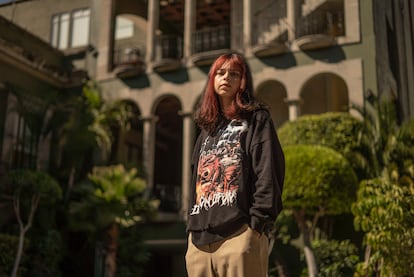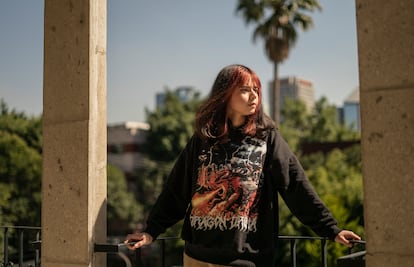Bratty: ‘A lot of things in the music industry are fake and shallow’
The singer, originally from Culiacán, Sinaloa, talks about her experience of being the only Mexican act at Coachella and finding an audience in the United States while putting together her third album

“I’ve never had a show that made me feel so much.” Bratty, 22, describes her participation in this year’s Coachella festival — one of the most famous festivals in the world — where she was the only Mexican act on the bill. On her first night there were nerves, stress, and tension before going on stage in front of an audience whose reaction she couldn’t predict. On the second night, everything went up a notch. “I disassociated myself. Like in the movies. I was singing and playing, but at the same time I was thinking: ‘What the hell? What am I doing here?’ [...] I realized that my dreams were coming true.”
For an artist from Culiacán, Sinaloa, getting to Coachella seemed like an impossible dream. Few Mexican artists (especially those far removed from popular or trendy music) manage to get a place in the spotlight, and even fewer find a way in with foreign audiences. However, this has changed in recent years: the American audience (largely made up of Latino descendants) is more open to Spanish-language music, which opens up possibilities for artists like Jennifer Abigail Juárez Vázquez (Bratty’s real name), and her style of rock that is somewhere between garage rock and bedroom pop.
At her gigs in the United States, she meets people who do not speak Spanish. She says that she has asked people who go to her concerts if they understand her or if they know what she is singing about. “Some people would tell me no, but that they liked the music. Others say they translate them or look up the translation on the internet, or just like the way the music makes them feel. It’s another way of looking at music as something very special,” she says. She notes how it is interesting that, while in Spanish-speaking countries fans used to look for an artist’s songs in English, or didn’t fully understand them, but liked the way the songs made them feel, now the roles have changed, or rather, have diversified. And while in the beginning Bratty’s audience was mostly teenagers, her musical and lyrical evolution has led her to find an audience of different ages. “I’m maturing and at the same time the lyrics are maturing, and the audience also notices that evolution [...] In the end, it’s music. You can be any age you want (and come to my gigs).”

Her most recent work was the EP appropriately named Es mi fiesta y si quiero hago un EP [It’s my party and if I want to I’ll make an EP], a work in which she collaborated with national and international acts such as Álvaro Díaz, Depresión Sonora, and Hinds — a Spanish group that, she says, “I had always admired.” And, while some artists may lose a bit of their unique sound in collaborating with others, Bratty’s personality permeates each song. Those who have followed her since her first work four years ago may notice how even these processes have led her to a broader exploration of what it is possible to create. “Lyrically, musically, in recording quality... I think you need to take advantage of the tools that are available and do something better. Don’t do the same thing all the time,” she says.
The 22-year-old singer is in a constant process of discovery and learning. “I really like to learn (from collaborations), and also from the people I’m working with,” she adds, referring to industry professionals such as Julián Bernal, who is currently producing her next album. “I trust the process because they are there to teach me.”
She has already begun to release songs from her next album, like Radio, a song with pop punk influences in which she says honestly “I just want to stop being compared.” It will be her second album on the Universal Music Mexico label, which has also helped her find a larger audience. But being part of the industry in a more formal aspect than other independent artists has its downsides: “When you’re inside (the music industry), you realize that a lot of things are fake and superficial. Not everything is natural, and people are not like they seem. They seem like they’re acting, but they’re not,” she says with a tone of disappointment.
It was a disappointing reality check, a consequence of current marketing strategies that force artists to create a fictitious image for their fans. This was the case with Halsey, who said that her label wouldn’t allow her to release a single until “she could fake a viral moment for TikTok.” Despite all that, Bratty tries to remember that the important thing is to “have a good time.”
“There are people who take things too seriously, and others who let it get to them.” With that statement it is clear that, despite being an international artist who has been able to play at a festival as prestigious as Coachella, she is still the same young woman from Culiacán, enjoying a moment whose soundtrack is the music she herself has made. “Sometimes you have to have fun and take things as a joke, you know? And I try to keep that mentality.”
Sign up for our weekly newsletter to get more English-language news coverage from EL PAÍS USA Edition
Tu suscripción se está usando en otro dispositivo
¿Quieres añadir otro usuario a tu suscripción?
Si continúas leyendo en este dispositivo, no se podrá leer en el otro.
FlechaTu suscripción se está usando en otro dispositivo y solo puedes acceder a EL PAÍS desde un dispositivo a la vez.
Si quieres compartir tu cuenta, cambia tu suscripción a la modalidad Premium, así podrás añadir otro usuario. Cada uno accederá con su propia cuenta de email, lo que os permitirá personalizar vuestra experiencia en EL PAÍS.
¿Tienes una suscripción de empresa? Accede aquí para contratar más cuentas.
En el caso de no saber quién está usando tu cuenta, te recomendamos cambiar tu contraseña aquí.
Si decides continuar compartiendo tu cuenta, este mensaje se mostrará en tu dispositivo y en el de la otra persona que está usando tu cuenta de forma indefinida, afectando a tu experiencia de lectura. Puedes consultar aquí los términos y condiciones de la suscripción digital.









































